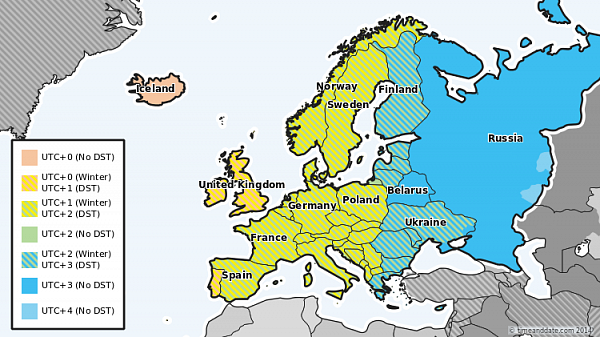DST starts in Europe Sunday, March 29, 2015
Sunday, March 29, 2015 clocks will be set forward one hour when Daylight Saving Time (DST) starts in most of Europe.

Summer time starts in most of Europe.
©timeanddate.com
USA start DST Sunday, March 8, 2015
More light in the evening
Sunrise and sunset will be about one hour later on Sunday, March 29, 2015 than the day before, so there will be more light in the evening.
Daylength, Sunrise & Sunset in your city
Same time all over Europe
European countries synchronize the start of DST at 1:00 (1 am) UTC on the last Sunday of March. They return to Standard Time again on the last Sunday of October.
- The European Union (EU) - including the United Kingdom, France, Germany, Spain, Italy
- Most other European countries - including Norway and Switzerland
Clocks will not change in Russia
The people in Russia will not be setting their clocks forward again 1 hour along with the rest of Europe, as they have done in the past. From March 29, 2015, the Russians remain on Standard Time (winter time) permanently.
Luhansk and Donetsk join Moscow
The “Luhansk People's Republic” and the “Donetsk People's Republic”, both self-proclaimed separatist states in eastern Ukraine, switched to Moscow Time on Sunday, October 26, 2014 and also remain on Standard Time (winter time) permanently.
European countries with no DST
1 hour back or ahead?
The clock moves ahead (= losing one hour) in the spring when DST starts, and falls back one hour (= gaining one hour) when DST ends in the fall.
To help remember which way to set your watch, keep in mind one of these sayings:“Spring forward, fall back” or “Spring ahead, fall behind.”
- Current local time in Europe
- Where and when do the clocks change next?
- Europe’s time zones and DST schedule
- A brief history on DST in Europe
Local times in Europe for DST start
| Time Zone during DST | DST starts | Standard Time Zone (no DST) |
|---|---|---|
British Summer Time (BST) used in UK during summer UTC offset: +1 hour | DST starts at 1:00 (1 am) local time. | UTC offset: None |
Western European Summer Time (WEST) observed in Portugal, Faroe Islands and the Canary Islands. UTC offset: +1 hour | DST starts at 1:00 (2 am) local time. Clocks are set ahead one 1 hour to 2:00 (2 am). | UTC offset: None |
Central European Summer Time (CEST), used in countries including France, Germany, Austria, Italy, Switzerland, Norway, Poland, Hungary, and Spain. UTC offset: +2 hours | DST starts at 2:00 (2 am) local time, when clocks are set ahead 1 hour to 3:00 (3 am). | UTC offset: +1 hour |
Eastern European Summer Time (EEST), used in countries including Bulgaria, Estonia, Finland, Greece, Latvia, Romania, Turkey, and most areas in Ukraine. UTC offset: +3 hours | DST starts at 3:00 (3 am) local time, when clocks are set ahead 1 hour to 4:00 (4 am). | UTC offset: +2 hours |
Most of the western parts of Russia and some parts of Ukraine are in the Moscow time zone, Moscow Standard Time (MSK). UTC offset: UTC +3 hours | UTC offset: UTC +3 hours |